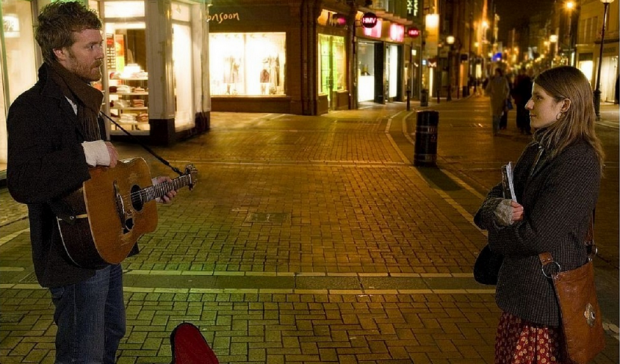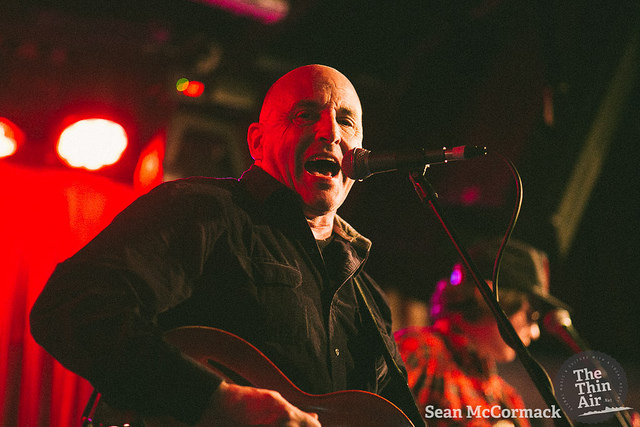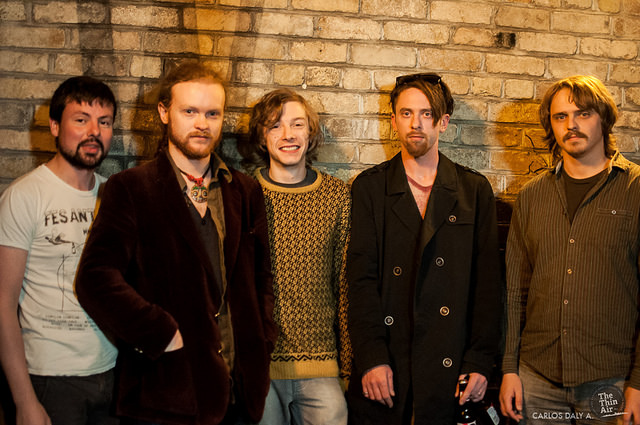In Irish writer-director John Carney’s musical comedy-drama Begin Again, released last year, troubled New York music executive Dan (Mark Ruffalo) sees young songwriter Gretta (Keira Knightley) perform at a downtown open mike session and, smitten with her music, gives her his card. He promises that with a bit of production pizazz and a half-decent video (maybe a Norah Jones vibe) she could have a real radio hit. Gretta rejects his commercialising instinct. She just wants to be real – let the songs speak for themselves and all that. The haggard but good-hearted Dan finds her idealism endearing and naive. ‘Name one artist that passes your authenticity test’ he demands. They agree, at least, on Randy Newman. It’s the first of the film’s recurring mentions of realness and fakery.
Indeed, Begin Again‘s obsession with the idea of authenticity is so strong that you can’t help but wonder if it’s compensating for something, a nervousness that comes from following up the success of Carney’s low-budget musical-romance Once, whose naturalism and emotional sincerity attracted a wealth of admirers at home and in the international markets. At what point does the insistence on authenticity become a kind of pose itself? It’s a problem the film can never resolve, recycling a lot of Once’s plot beats – a pair of music lovers bond and make an album – but failing to replicate its chemistry, recognisable sense of place and yearning, raw songs. Somewhere over the Atlantic the story lost its soul.
Nothing turns me off a film quicker than phoniness. As soon as I sniff a dodgy sales pitch, the walls go up. And yet I recognise that complaining about fakeness in the movies is a ludicrous missing of the point. Of course it’s fake. They’re light shows on a screen. In a culture saturated by glossy imagery and advertising vocab, we long for the red pill of reality. But in the whirring wheels of capitalism realness becomes another lucrative commodity, a buzzword for the money men to sell soap to insecure women. And for all our praise of keeping it real, aren’t we thrilled by music’s glamourous posturing, its wild history of alter egos and theatrics?
2007’s Dublin-set Once remains one of the most successful Irish cultural exports of recent memory. Carney, a former bass player and occasional video director for Irish group The Frames, had been trying to develop the project with the Irish Film Board for a few years. Previously he’d written and directed small features, dark and odd, including rape drama On The Edge and fake-alien comedy Zonad (which only got an official release after Once starting bringing in the cash). Given a tiny budget, Carney convinced The Frames frontman Glen Hansard (who had a minor role in 1991’s The Commitments) to take the lead after Cillian Murphy dropped out, pairing him up with Czech professional musician and first-time actor Markéta Irglová. They played two losers in love on the down-and-out fringes: the unnamed Guy works in his father’s hoover repair shop and busks when he can, while the Girl is a rose-selling immigrant who can barely afford batteries for her CD player. They are both nursing wounds of the heart, separated geographically and emotional from their partners, expressing their heartbreak and growing mutual attraction through the songs they share and perform together (most the songs were written by Hansard and Irglová, who were beginning to perform as two-piece The Swell Season).
Once cost 112,000 Euros to make and made $20 million worldwide in its first two years. It won festival awards and ‘Falling Slowly’, its signature track, got the Oscar for Best Original Song. Michael Phillips at the Chicago Tribune ranked it number one in his top ten of the year. It got a shout-out from Spielberg. Then it spawned a Broadway musical. The musical won eight Tony Awards and a Grammy. A boatload of cash for a film about the unquantifiable value of shared artistic expression. You can see why people reacted so positively to Once. It is an immensely, effortlessly likeable film, with its smallness and intimacy and shimmering, tightrope atmosphere of connection and desire. It also looks a lot like real life.
The street scenes, in which the Guy busks for the loose change of Grafton Street shoppers and catches the Girl’s attention with his off-peak, full-throated songs of love and loss, were shot on location with no permits and a wide lens, helping the performers forget about the cameras and letting filming go unbothered by curious passers-by. Shooting with natural light in Dublin streets, or the cramped spaces of the Guy’s childhood bedroom and the Girl’s flat, which she shares with her daughter and mother, Once convincingly renders working class textures. The Guy’s father is gruff and tight-lipped, but brings a tray of tea to the band during their rehearsals in his son’s single-bed room. The Girl can’t afford a piano, but a shop owner lets her have a go during his lunch break. Before the Guy goes off to London to try and make his fractured relationship work they record a small EP together: to pay for studio time, he gets a suit from a charity shop and convinces a loan officer to lend them three grand. Very little of this feels like rock star fantasy.
In Begin Again, the conflict between selling out and staying true to the music is dramatised in the divergent paths of Gretta and her boyfriend (Adam Levine). They both write songs but he’s the one being courted by sleazy record producers, leaving her to tag along as the supportive girlfriend. As the pair drift apart, his descent into moneyed douchbaggery marked by a series of increasingly insufferable hipster facial hair choices. While he turns the couple’s delicate songs into junky, up-tempo pop hits, she holds onto her integrity. When Dan asks her what she writes for, she tells him ‘pleasure’. She doesn’t even have a demo tape to impress Dan’s partner (played by Mos Def) so she just plays the acoustic guitar. Kicking it old school! Gritta and Dan are so dedicated to authenticity they record her album live in various New York locations to capture the sounds of the streets. Dan pitches it as a valentine to their crazy city, but it’s exactly the kind of gimmick a suit from marketing would love, and the weightless, unanchored recording scenes could have been shot anywhere really, on location or on a studio lot. The film laughs at the preening boyfriend, but maybe it should be laughing at itself.
The more Begin Again insists on its organic, free-spirit realness, the more calculating it seems. It is like Once‘s glossy, Hollywood bastard cousin, smothered by the money and big studio process. Ruffalo is the kind of unthreatening, charismatic booze hound the movies love, and it’s hard to buy teethy, perfect Knightley as a delicate, heartbroken artist, despite her vintage bicycle and summery H&M dresses. Knightley is an adequate singer, but the studio-version dubbing in her recording scenes takes you out of the moment. And neither her singing style, nor the quality of the flimsy folky songs themselves (written mostly by r3ecord label ALXNDR’s Grey Alexander), seem enough to justify Dan’s claim that she stopped him from killing himself. The film’s original title was the on-the-nose Can A Song Save Your Life?, the answer to which is yeah, maybe, but it better be one hell of a song. There is nothing here to match Hansard’s scorching, blood-and-guts rendition of ‘When Your Mind’s Made Up’ in Once’s recording studio. Redemption has to be earned.
Still, maybe Once isn’t entirely innocent of Begin Again’ssins. On rewatch its weakness for affectation and cliché becomes more noticeable: the cynical studio sound guy who’s won over by the plucky performer; the scene where they go to the beach and throw a Frisbee around after their all-nighter instead of going home to bed; the coy universality of having unnamed protagonists. One detail has always bothered me. When Guy tells Girl about his day job, she asks if she can bring him her broken vacuum the next day; he agrees and she surprises him the next day as promised during his street rendition, dragging her hoover across the cobblestones by its long suck-nozzle. He’s got things to do before he gets to the shop, so they dander about together, her cleaner clattering behind them. But why doesn’t she bring it in a box? Or a bin bag? Well, because this way is cuter, more revealing of her childlike obliviousness. There’s a hint of quirk here. Reviewing the Broadway musical in the New York Times, Ben Brantley observed how the Girl ‘has turned into a full-fledged version of what she only threatened to be in the film: a kooky, life-affirming waif who is meant to be irresistible’. Later in the review, he admits that however cliché the story seems in its bare stage form, it’s the songs that save it.
This apparent difference between film and stage is a reminder of form. The sleekness of Begin Again’s music-set montagesis off-putting, but if they gave the script to unknowns and took an axe to the budget would it be easier to connect with? Maybe. It is worth reminding ourselves the extent to which authenticity is if not an accident, then at least a product of circumstances, a matter of style, resources, genre and collaboration.
Ultimately, Once moves not simply because of its grubby verite style, but because of the strength of feeling in its performances and music. When the Guy shows the Girl his room and asks if she wants to stay the night, you feel his loneliness and his wishful desperation. Hansard’s pleading, hangdog eyes; Irglová’s halting pause before she gets his drift; her curt ‘fuck this’ exit. The actors’ off-screen romance is an irresistible side story, but it’s the movie moment that counts; love and pain communicated with craft and attention. There’s nothing wrong with fakeness, so long as it’s a fakeness we can believe in. Conor Smyth






